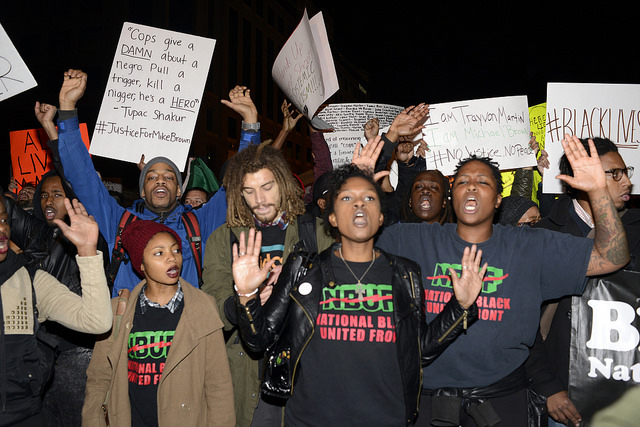
By Raillan Brooks
There are very few wise purposes at work when someone takes to social media to comment on race in America. (If you’re drawing comparisons to the non-indictments of Darren Wilson and Daniel Pantaleo to OJ’s acquittal, please continue to miss me.) There are even fewer behind what gets trending: at the height of the chaos brought by the unanswered-for deaths of Eric Garner and Michael Brown, when I finally decided to write something, these were the hashtags topping my networks: #Holidaze, #PeterPanLive, #OrionLaunch, #AshtonCarter, #DidiGregorius, #TheNewRepublic, #BestRapPerformance. A measure of frivolity is a measure of freedom, after all.
Oh well. I still created #MyBlackTeacher. I asked my friends and family on Facebook and Twitter to name the black person or people in their lives who gave them love, tough or tender, who showed them new paths, who steered them back on one, who cheered their successes, who succored their sadnesses. I did not set out to say that black people ought to instruct others in the fact of our own humanity, as absurd as it is that anyone needs convincing that black lives matter. But at a moment when white supremacy has never been so apparent or so putrid, a little reminder could not hurt.
Engaging with us even occasionally might diffuse some of the stereotypes that so terrify white people that they unload an entire magazine in our backs or wrap their arms around our necks.
The stories poured in. One woman said her sister’s work to defeat racial injustice as a lawyer taught her the pleasures of helping others. Another celebrated the late uncle who taught her even as a child about the nature of choice, and eventually, existence. There was the middle school math teacher whose white student 15 years on was still thrilled by the challenge of a word problem, and grateful. There was the black child who taught his white teacher what it meant to believe in someone else’s success. Some people explained how their “black teacher” taught them what it meant to live a life of service, whiles others attributed their sharpened writing to the black editors who challenged them to think just a little bit harder. Still others explained to their white charges the simple but kind gesture of keeping one’s smelly feet off the table. And in one, in perhaps the most radical act of them all, a black person taught another non-black person how to take herself less seriously. This was testimony: a rolling account from where one stands of the mundane that, when looked back on, attests to something not mundane at all.
But this goodwill, ultimately, was a byproduct. Like any writer, my motives—two of them—were selfish. The first was that I needed something to fish me out of bone-pulverizing depression: Fixated on black death, I began to list all the ways my blackness truncates my life. I recited all of them, over and over. Round and round I went, letting myself become nothing. To break the cycle, I started a conversation around the ways black people have nourished those in their communities, to shift my attention and that of others to the granular joys and little lessons that make up any life, black or white.
#MyBlackTeacher is here to out, by process of elimination, those of you who have never interacted meaningfully with a black person.
The second was the prayer of a cynic: #MyBlackTeacher is here to out, by process of elimination, those of you who have never interacted meaningfully with a black person in your lives. For the reader starting to raise her hand: Don’t. There’s a lot of you. The fact is, most white people are so obsessed with a teleological, hand-waving notion of Progress that they rarely stop and wonder, when was the last time I talked to a black person? Was it today? Yesterday? Last week? Last month? Ever? By generating a tag that spoke just as loudly when you couldn’t use it, I wanted to catalyze that introspection. And if your count was zero or close to it, that maybe, just maybe, some conscience might step in and wonder, why?
Police kill fictions; to slay a demon, a creature of fantasy, is lifted up as a hero’s act. But the malevolent spirit craving black death does not only inhabit police. It lives in other, less obvious villains. It lives in the schoolteacher who once asked me if I could teach the class some of my mother tongue, Ebonics. Or in the nice-enough white girl who was supposed to rent a room in my Crown Heights apartment, but who then backed out after walking five blocks lined with black-owned businesses, suddenly worried that it was an “unsafe neighborhood.” Or in the white gay man I met on OkCupid who ended the date disappointed I didn’t look as white in person as I did online.
It’s stupid to think that being friends with black people generates a specific set of politics. It’s less stupid to think that engaging with us even occasionally might diffuse some of the stereotypes that so terrify white people that they unload an entire magazine in our backs or wrap their arms around our necks. How far my measly hashtag will travel is uncertain. But if you can count the number of black lives you cherish on one hand, tell me, what do you know about saving them?
Raillan Brooks is a writer and editor based in Brooklyn. He writes on the environment, labor, and urban politics and is the Social Media Co-Editor at Guernica. His work has appeared in the Village Voice, The New York Times Book Review, Audubon, Next City, and others. Follow him on Twitter here.

